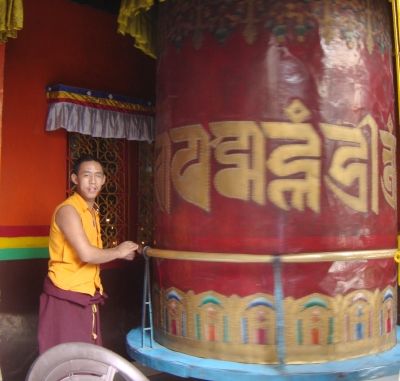 Thursday’s Lok Sabha elections will be a landmark for Delhi's Tibetan youth as they will get the right to vote in their adopted homeland, reports Anshul Gupta.
Thursday’s Lok Sabha elections will be a landmark for Delhi's Tibetan youth as they will get the right to vote in their adopted homeland, reports Anshul Gupta.
For the first time since they arrived in India more than five decades ago, Tibetan immigrants living in a Delhi settlement will vote in India's parliamentary election on Thursday.
Thousands of Tibetans fled across the Sino-Indian border in the late 1950s when Mao Zedong's forces seized their homeland. Some took refuge in the North Delhi colony called Majnu Ka Tila where they were provided makeshift shelters.
Over the years these makeshift shelters have morphed into permanent homes. The first and second generations spent their lives coping with the basic issues of bread and shelter. The third generation has now gained the right to vote. Though according to Indian law, a person born on or after July 1, 1987, is a citizen of India if either parent is Indian, Tibetan settlers in some parts of India did not receive that right till a Karnataka high court ruling in August 2013. That verdict had held that children of Tibetan refugees born in India between 1950 to 1987 cannot be denied enrollment in voters’ list.
Katen Tsering, head of the Residents Welfare Association at the Tibetan colony, said, "Only a few people have enrolled for voter ID cards because of the shortage of time and lack of necessary residence proof."
Out of 350 families at Majnu Ka Tila, only about a dozen have registered. Others tried to register but were late. As a result, most politicians are not paying much attention to the colony.
Asked which party they would favour, Katen said, "We are not favouring any party but we will push for our rights from whichever party comes to power."
But the first-time Tibetan voters are clear what they want. It's not very different from what the average voter in Delhi wants. As one shopkeeper said, "We want better schools, hospitals and roads."
The residents of Majnu Ka Tila are mainly traders, tour registrars and guides. Many also sell Tibetan products in the narrow lanes of the colony. Most of them are happy with what the government has provided till now.
Tenzin Wangchuk, 27, a member of the Tibetan National Congress, said, “We are happy that the Indian government has given us many amenities. Most importantly, they have provided us exclusive schools where our community’s children can study.”
However, many parents in the settlement want better schools. Suman, who operates a food business and has a child, said, “I will vote for that party which can promise me that my child will be better educated and can live a respectable life.”
The younger generation, which has been educated in Indian universities, can now get jobs, thanks to citizenship. Norbu, a 22-year-old graduate from DelhiUniversity, said, “I would like to give my vote to the Congress because they have promised better jobs for youth.”
A mother of two, shopping for groceries, said, “I am waiting for my voter card. I will vote for the Aam Aadmi Party because they will bring down inflation by reducing corruption”. The woman, however, was unwilling to give her name.
What also needs addressing, say residents, is the discrimination that the Tibetans sometimes face in the public sphere. Chime, a young woman who has also applied for her voter ID card, said, “Now that we have a voter card, perhaps the discrimination we sometimes face will end and we can get good jobs.”
The Tibetans are slowly finding their political voice in their adopted homeland. Irrespective of whom they vote for, this election will be a landmark for these one-time refugees as they become part of the Indian mainstream.
Image: A Tibetan youth in Delhi's Majnu Ka Tila. Photograph: Rishabh Gupta.
This coverage is part of Project India, a journalism initiative organised by Bournemouth University, the UK, and supported by Rediff.com.








 © 2025
© 2025